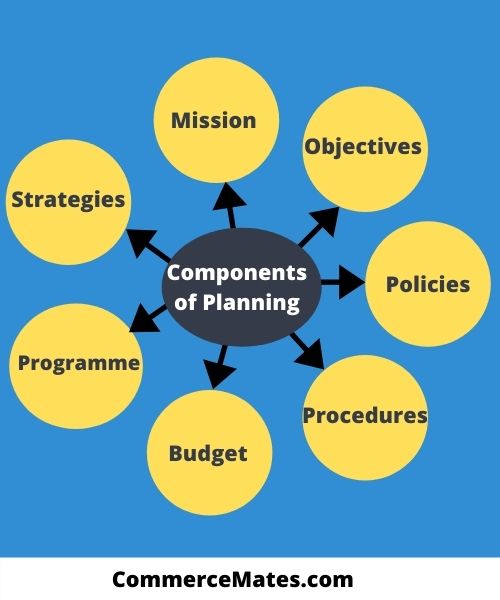A process of planning comprises of various components such as mission, objectives, policies, procedures, budget, programme and strategies. All of these are explained in detail in points given below: –
Contents
Components of Planning
Mission
Mission is the first component of planning that determines the fundamental purpose of every business organization. It basically tells for what purpose the business enterprise is carrying out is activities or what it wants to achieve. Mission of any organization denotes the direction in which it needs to make efforts for accomplishing their targets.
A mission statement clearly states the products and customer of business. This statement may be either in a written form or implicit from functioning of organization. It also reflects the beliefs and values of corporation and one can easily get to know the attitude of organization towards its workforce through it. Mission statement is used by distinct stakeholders of business for their relevant purposes.

Objectives
Objectives simply refers to the position which an organization is willing to attain. They are the end results of business and are also denoted as targets or goals. Setting of goals is starting point for planning as well as other management functions of business. Every business has distinct types of objectives that may be either individualistic and collective, general or specific in terms of their scope and long-term or short-term as per their time period. Objectives should be laid down by management team effectively and precisely by considering the mission and values of business. Managers must ensure that objects for each activity must be compatible with one another.
Policies
Policies are key component of a successful plan which basically guides the decision making of business enterprise. They put limits on scope of every decisions and manages basic leadership process for every operation of organization. Policies are formulated for distinct activities of business such as production, sales, human resource, etc. by managers. It must be ensured by management team that policies are not too much rigid that they are imposing excessive limits on functioning. They must be changed from time to time in accordance with the circumstances and challenges for better functioning of business organization.
Procedures
Procedures are the guidelines that directs the actions of managers and employees of an organization. They cleary demonstrate the manner for doing something. Procedure comprises of step-by step methods and also includes rules which regulate actions. It must be ensured by procedure of planning that procedures are concrete and practical. Procedures should be flexible and not too rigid as it makes the process of planning quite difficult.
Budget
Budgets refer to the plans that portray the expected results in numerical terms. It needs to be created by a business that expects to achieve something. A business will decide its objectives only by deciding its budget. A technique of budgeting is needed for most of the decisions, targets, and activities. For example, an income budget will reveal the financial profits and results of a business enterprise.
Programme
Programme relates to the outline of the broad objective of business enterprise. It represents a sequence of procedures, series, and policies that need to be implemented by the organization. Programme of a business enterprise describes series of necessary efforts that are systematic and have an order of priorities. These efforts are a must for the achievement of business objectives. Programmes are of two types that are short-term programmes and long-term programmes. Short-term programmes are like training programmes, sales promotion programmes and market research programmes. Long-term programmes includes programmes concerned with raising efficiency of supervisors, expansion of institution, modernization, office renovation etc.
Strategies
Strategies relate to a minute plan of action that focuses on attaining specific requirements. Effective strategy implementation assists in reaching out to the requisite goals. The process of strategizing depends upon the mission and values of the organization. Strategies are very effective and implemented by organizations to meet the challenges posed by their competitors in the market. Internal strategies and external strategies are two types of strategies that are formulated by the management team.